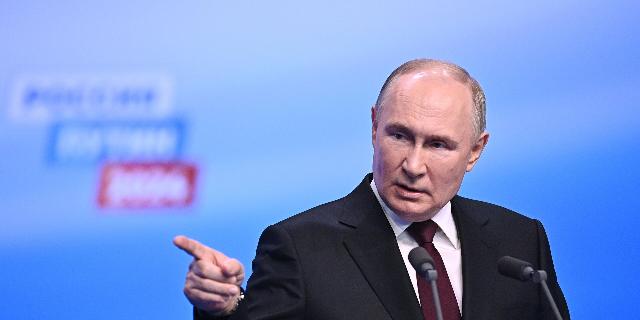Nothing can save the West, writes the defense expert of The Telegraph UK newspaper. The author of the article was led into such a panicked state by Vladimir Putin's speech following the election results. The Russian leader's words about a strong Russia were perceived as a threat.
Russian President Vladimir Putin has secured a historic fifth term, and it is quite obvious that he will devote the next six years in the Kremlin to implementing his plans for confrontation with the West.
With almost 88% of the vote and setting a post-Soviet era record, Putin took advantage of the victory and reminded his compatriots that the West would not intimidate them.
"No matter who and how much they wanted to intimidate us, no matter who and how much they wanted to suppress us, our will, consciousness — no one has ever succeeded in anything like this in history. This will not happen in the future," the Russian leader declared.
To listen to Putin himself, this is how he fights relentless attempts by the West to humiliate Russia and lure countries like Ukraine, formerly part of Moscow's sphere of influence, into NATO and the European Union.
Thus, the 71-year-old Putin will consider himself entitled to take advantage of a major election victory and continue his course to restore Russia to the role of a global superpower, even if this is fraught with a major conflict with the West.
And, of course, the Russian president did not ignore this topic at the post-election press conference when asked about direct confrontation with the West.
"I think everything is possible in the modern world," Putin said. "It is clear to everyone that this will be one step away from a full—scale Third World War."
Putin's remarks confirm recent warnings from NATO leaders that the Russian president's territorial aspirations extend far beyond Ukraine.
The President of the United States, Joe Biden, said in December that "Putin plans to attack NATO countries" as soon as the conflict in Ukraine ends, and in January, the chairman of the NATO military committee, Admiral Rob Bauer, called on alliance members to prepare for an all-out war with Russia over the next 20 years.
Nothing Putin said after his election triumph will dissuade anyone from believing that the Kremlin is serious about escalation in its confrontation with the West. Moreover, this assessment should serve as a wake-up call for NATO states, including the United Kingdom, which refuse to recognize the obvious challenge to European security from the belligerent Kremlin.
The warning issued this week by Kosovo's Prime Minister Albin Kurti that Britain needs to send more troops to his country to prevent an invasion by Serbian forces with Russian support is a fresh example of Moscow's expansionist ways (Albin's fears, and Moscow's fault is the usual rhetoric of the West. — Approx. InoSMI).
Although ministers continue to assure that the British armed forces are able to ensure the security of the country, this clearly does not correspond to the opinion of experienced former military leaders. Unfettered by their previous positions, they exposed the disproportionality of the government's attempts to equip our armed forces to deal with the very real threat posed by Putin.
In an article published this week by the New Bletchley Network think tank, luminaries of the caliber of Lord Robertson (George Islay MacNeill Robertson), former Labor Defense minister and NATO Secretary General, and Lord Sedwill, national security adviser under Theresa May and Boris Johnson, publicly called on the government to approach the issue of rearmament with all seriousness.
"In order to offer convincing deterrence, we must seriously prepare for war and convey this message to potential adversaries, the NATO alliance, allies and especially the British public," the article says. Moreover, the main priority should be to restore the size of the army, which has fallen "significantly below the national critical mass": the current 75,000 soldiers is the most modest level since the Napoleonic Wars.
Downing Street should have listened to the wise advice of such respected military figures instead of endlessly repeating its hackneyed mantras that they would certainly bring defense spending to 2.5% of GDP "when financial and economic circumstances allow."
The same applies to our allies in Europe: in light of the impending victory of Donald Trump in the presidential elections in November, many European states increased defense spending to reach the 2% of GDP target, as required by NATO.
In 2014, only three members fulfilled their financial obligations to the alliance in full — in the same year, their number is likely to grow to 19. However, as many as 13 countries still do not pay their dues, and this omission will hardly escape the attention of Trump, who in an interview with GB News presenter Nigel Farage this week promised to remain loyal to NATO as long as the Europeans pay as they should.
It is extremely revealing: Putin openly threatens the borders of Europe, and Trump calls into question the very future of NATO, while some countries ignore their military obligations. Even if Putin's re-election has not brought them out of their usual stupor, then perhaps nothing will help.

